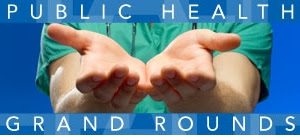
We are pleased to present the November session of Public Health Grand Rounds, “Improving the Lives of People with Sickle Cell Disease.” This session will be available via live webcast from CDC headquarters in Atlanta, Georgia on Tuesday, November 15, 2016, at 1 p.m. (EST).
Sickle cell disease (SCD) describes a group of inherited disorders that can cause red blood cells to develop in an abnormal, rigid sickle or crescent shape. These inflexible sickle-shaped cells can stick to the walls of blood vessels and block the flow of blood completely, leading to a lack of oxygen in surrounding tissues. In addition to sudden, excruciating pain events known as pain crises, SCD can lead to strokes, organ damage, joint and bone problems, and other severe health consequences. The effects of SCD begin around 5 or 6 months of age and continue over a person’s lifetime. There is no national registry for SCD, but experts estimate that this disease affects approximately 100,000 people in the United States alone.
Over the past 30 years, treatments for SCD and its complications have improved average life expectancy, but these treatments can be costly and invasive. Additionally, healthcare needs and access to care may change over the course of a patient’s life. Through continued collaboration with clinicians, researchers, and the SCD community, we can identify critical gaps and better understand how these treatments can improve the lives of people with SCD.
In this session of Public Health Grand Rounds, experts will discuss SCD, what we know, and how far we have come in just a few decades.
Future Grand Rounds topics include using public health law to address emerging health concerns, and addressing the unique challenges of opioid use disorder among women.
Email your questions about this topic before or during the session. Follow us on Twitter #cdcgrandrounds
CDC’s Public Health Grand Rounds Presents:
“Improving the Lives of People with Sickle Cell Disease”
Tuesday, November 15, 2016
1:00 p.m. – 2:00 p.m. EST
Global Communications Center (Building 19)
Alexander D. Langmuir Auditorium
Roybal Campus
Presented by:
Mary Hulihan, DrPH
Health Scientist, Epidemiology and Surveillance Branch
Division of Blood Disorders
National Center on Birth Defects and Developmental Disabilities, CDC
“Using Data to Understand Gaps in Care and Outcomes”
Kim Smith-Whitley, MD
Medical Director, Sickle Cell Clinical Program
Children’s Hospital of Philadelphia
Chief Medical Officer (Immediate Past)
Sickle Cell Association of America
“The Sickle Cell Community and Pediatric Care”
Kathryn Hassell, MD
Professor of Medicine, Division of Hematology
University of Colorado Denver
“Improving Outcomes for Adults with Sickle Cell Disease”
Jean Raphael, MD, MPH
Associate Professor, Pediatrics
Baylor College of Medicine
Director, Center for Child Health Policy and Advocacy
Texas Children’s Hospital
“A Health Policy Approach to Sickle Cell Disease”
Facilitated by:
John Iskander, MD, MPH, Scientific Director, Public Health Grand Rounds
Phoebe Thorpe, MD, MPH, Deputy Scientific Director, Public Health Grand Rounds
Susan Laird, MSN, RN, Communications Director, Public Health Grand Rounds
For non-CDC staff interested in viewing the session:
A live external webcast will be available via the Webcast Links section of our website. For individuals who are unable to view the session during the scheduled time, a video of the session will be posted to our archives 2-3 days after the presentation.
For non-CDC staff who wish to attend in person:
Due to security measures at CDC’s Roybal campus, non-CDC staff who wish to attend in person must have prior clearance and a U.S. passport or state-issued photo ID (e.g. driver’s license). Names of non-CDC staff (both domestic and international) who wish to attend in person should be submitted to the Grand Rounds team. Please note that all information for international visitors must be submitted at least 10 business days in advance.
For individuals requiring reasonable accommodations:
It is the policy of CDC to provide reasonable accommodations (RA) for qualified individuals with disabilities to ensure their full inclusion in CDC-sponsored events. Employees are asked to submit RA requests at least 5 business days prior to the event. Please email the request to grandrounds@cdc.gov.
Grand Rounds is available for continuing education.
All continuing education credit for Public Health Grand Rounds (PHGR) is issued online through the CDC/ATSDR Training and Continuing Education Online system. If you have questions, you can email Learner Support, or call them at 1-800-41-TRAIN (1-800-418-7246).
Those who view PHGR either in person or via IPTV or web on demand and who wish to receive continuing education must complete the online seminar evaluation. Thirty days from the initial seminar, the course number will change to WD2346 and will be available for continuing education until February 18, 2018. The course code for PHGR is PHGR10.
Target audience: physicians, nurses, epidemiologists, pharmacists, veterinarians, certified health education specialists, laboratorians, others
Objectives:
- List key measures of burden of disease involving morbidity, mortality, and/or cost.
- Describe evidence-based preventive interventions and the status of their implementations.
- Identify one key prevention science research gap.
- Name one key indicator by which progress and meeting prevention goals is measured.
CE certificates can be printed from your computer immediately upon completion of your online evaluation. A cumulative transcript of all CDC/ATSDR CE credits obtained through the TCE Online system will be maintained for each user. We hope that this will assist CDC staff and other public health professionals in fulfilling the requirements for their professional licenses and certificates.
Learn more about continuing education on the Grand Rounds website.





















.png)









No hay comentarios:
Publicar un comentario